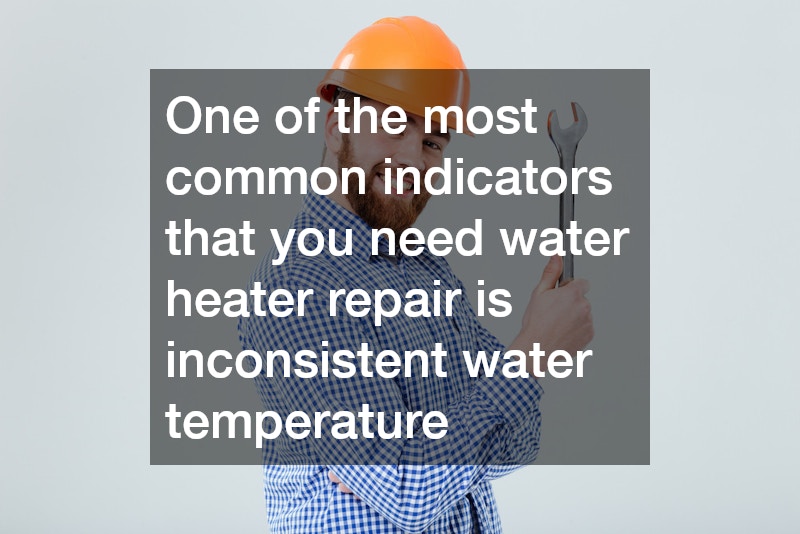As a homeowner, ensuring your water heater is functioning correctly is essential for maintaining your household’s comfort and efficiency. Knowing the signs that indicate you may need water heater repair or replacement can prevent unexpected inconveniences. Addressing these issues promptly can also extend the lifespan of your water heater, providing more value from your investment.
Inconsistent Water Temperature
One of the most common indicators that you need water heater repair is inconsistent water temperature. If you find that your water alternates between being too cold and too hot or never reaches a proper hot temperature, it could be a sign that your water heater needs attention. This inconsistency could be due to sediment buildup in the tank, which affects the heater’s efficiency and durability over time. Sediment acts as a barrier between the heating element and the water, making it harder for the heater to do its job. Regular maintenance, including flushing the tank, can help prevent this problem, but sometimes professional repair may be necessary.
The thermostat on your water heater could also be malfunctioning, leading to unpredictable water temperatures. Temperature fluctuations might not seem like a big deal initially, but they can indicate a more severe underlying problem with your water heater. A faulty thermostat does not correctly regulate the heating process, leading to inefficient energy usage and higher utility bills. In some cases, recalibrating or replacing the thermostat may resolve these issues, but it might be a precursor to a larger appliance failure. Consulting a professional for a diagnosis can offer more clarity and help determine whether a repair or a complete replacement is in order.
Aging water heaters are particularly susceptible to inconsistent water temperatures as their components wear out over time. Most water heaters have a lifespan of around 8 to 12 years, depending on maintenance and usage. As these units age, the probability of facing significant issues like temperature inconsistency increases. Regular inspections can help identify potential problems early and prevent unexpected breakdowns. If you consistently experience these issues, especially with an older unit, it might be more cost-effective in the long run to replace rather than repair.
Strange Noises from the Heater
Unusual noises coming from your water heater could be a sign that water heater repair is needed. These noises often result from sediment buildup at the bottom of the tank, where water is heated. When the heating element tries to warm up the water through this layer of sediment, it can cause a rumbling or popping noise. Such sounds indicate that your heater is not running efficiently and that the sediment is taking up space that should be occupied by hot water. Regular flushing of your water heater can help mitigate this issue and extend the life of your appliance.
Besides sediment-related noises, you might also hear high-pitched sounds like screeching, which can be due to water flow restrictions within the heater. These restrictions can cause pressure build-ups that the heater tries to relieve through safety valves, causing the unusual sound. Such issues not only decrease water pressure but can also pose safety hazards if left unaddressed. If you experience persistent high-pitched noises, it’s advisable to call a professional to inspect the system and solve any pressure-related issues.
Age is another factor contributing to weird noises from your water heater. Components such as the heating element, dip tube, or even the tank itself might deteriorate, causing a range of sounds. While some of these issues can be addressed with repairs, others might suggest that a replacement is more prudent. Awareness of the condition and age of your heater can provide insight into the most effective solution, whether it’s repair or investing in a new unit for more reliability and efficiency.
Discolored Water or Rust
Discolored water, particularly if it appears rusty, is another warning sign that you may need water heater repair or replacement. Rusty water is often indicative of corrosion inside the tank, suggesting that your water heater’s condition might be worsening. This could be due to the anode rod, which is designed to attract corrosive particles, reaching the end of its life. If ignored, the rust can lead to leaks that not only damage your heater but also other parts of your home. Replacing a corroded anode rod in a timely manner can prevent this, but extensive rust damage often calls for a new water heater.
Examining the source of the discolored water can also provide insight into whether the problem lies with the water heater or the plumbing. If only hot water appears rusty while cold water remains clear, it’s usually a sign that the heater is at fault. On the other hand, if both hot and cold water show discoloration, your plumbing might be the problem. Identifying the source correctly is crucial to ensure the right target is addressed, preventing unnecessary repairs or replacements. Consulting with a professional plumber can help accurately diagnose the situation and recommend the best course of action.
Exposure to rust and corrosion not only affects the water’s quality but can also lead to compromised structural integrity of the tank. Over time, small patches of rust can expand, weakening the tank and increasing the risk of leaks or ruptures. Regular inspection for these signs, especially in older units, is important for homeowner peace of mind. If your water heater is nearing the end of its lifespan and showing signs of rust and corrosion, replacement might be the most practical long-term solution.

